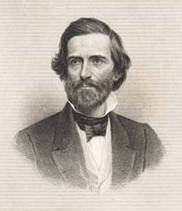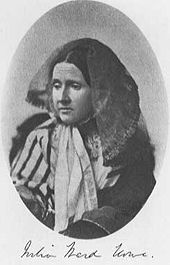Samuel Gridley Howe
(1801-1876)
"The Refugees from Slavery in Canada West"
Samuel Gridley Howe was born in Pearl St., Boston, Massachusetts. His father, Joseph Howe, was a ship-owner and manufacturer and his mother, Patty Gridley, one of the most beautiful women of her day. In 1818, Howe attended Brown University, where he spent much of his time playing practical jokes. A classmate, future President of Brown University, Dr. Caswell, described Howe in this way, "He showed mental capabilities which would naturally fit him for fine scholarship. His mind was quick, versatile, and inventive. I do not think he was deficient in logical power, but the severer studies did not seem to be congenial to him." Upon graduating from Brown in 1821, Howe went on to attend Harvard Medical School and obtained his degree of M.D. in 1824.

Howe spent several years traveling abroad. He sailed to Greece and was a surgeon in the Greek Revolution from 1824 to 1828. He then spent some time in medical studies at Paris. His enthusiasm for a republican form of government led him to take part in the second French "July" Revolution in 1830. In 1832, Howe returned to American soil. Howe began the Perkins Institute for the Blind. He opened a printing-office and organized a fund to print for the blind. The Institution became one of the intellectual centers of American philanthropy. In 1837, Howe brought Laura Bridgman, a deaf-blind girl, to the school and she became famous as the first known deaf-blind person to be successfully educated. Laura became a teacher at the Perkins Institute. Dr. Howe himself was the originator of many improvements in method as well as the process of printing books in Braille. Besides acting as superintendent of the Perkins Institution to the end of his life, he was instrumental in establishing a large number of institutions of a similar character throughout the country.
On 23 April 1843 he married Julia Ward, daughter of wealthy New York banker Samuel Ward and Julia Rush Cutler. Julia was an ardent supporter of abolition and was later active in the cause of Woman's Suffrage. She composed the Battle Hymn of the Republic. Many of their arguments centered on Julia's desire to have a career apart from motherhood. Although, Dr. Howe was progressive by the standards of the day, he did not support the idea of married women having any work other than that of wife and mother. They had six children: Julia Romana Howe (1844-1886), Florence Marion Howe (1845-1922), Henry Marion Howe (1848-1922), Laura Elizabeth Howe (1850-1943, a Pulitzer prize-winning author), Maud Howe (1855-1948, a Pulitzer prize-winning author), and Samuel Gridley Howe, Jr. (1858-1863).
Howe was a founder of an antislavery newspaper, the Boston Daily Commonwealth, which he edited (1851-1853) with the assistance of his wife, Julia Ward Howe. He was a prominent member of the Kansas Committee in Massachusetts, and was interested in the plans of John Brown. Although he disapproved of the attack upon Harper's Ferry, Howe nevertheless funded John Brown's work as a member of the Secret Six. After Brown's arrest, Howe temporarily fled to Canada to escape prosecution. According to Samuel Howe's daughter, Florence Hall, the Howe's South Boston home was a stop on the Underground Railroad. Although this is uncertain, it is known that Dr. Howe vehemently opposed the Fugitive Slave Law.
In 1850, Dr. Howe along with Thomas Wentworth Higginson, Theodore Parker and other abolitionists, stormed Faneuil Hall attempted to free a captured escaped slave, Anthony Burns. Burns was going to be sent back to his slave owner in Virginia in accordance with the Fugitive Slave Law. The abolitionists hoped to rescue Burns from that fate. Howe declared outside the hall that "No man's freedom is safe until all men are free," and shortly afterward the abolitionists stormed the hall, breaking through the door with a battering ram. A deputy was accidentally shot in the ensuing fracas. Federal Troops finally put an end to the attempted raid and Burns was returned to Virginia. The men didn't abandon Burns, however, and within in a year of Burns' capture they had raised enough money to purchase Burns' freedom from his slave owner.
In October 1854, Dr. Howe violated the Fugitive Slave Law with assistance from Capt. Austin Bearse, to rescue an escaped slave who had come into Boston Harbor from Jacksonville, Florida, as a stowaway aboard the brig Cameo. The Boston Vigilance Committee then helped the man evade slave-catchers and reach freedom.
In 1863, Dr. Howe returned to Canada on behalf of Edwin Stanton of Abraham Lincoln's administration (Commission on Canadian Negroes), to interview former slaves who settled in Canada after fleeing on the Underground Railroad. Life in Canada wasn't free from the bigotry that freedmen and women experienced in the Northern Eastern United States. However, Howe wrote that overall their lives had improved, as they were now free to earn a living, marry, attend school, and church out of the reach of slave-catchers. An account of his interviews and experiences were published in 1864, The Refugees from Slavery in Canada West. Howe's report became a strong arguement for the Fourteenth Amendment in the Congressional debate. During the Civil War Howe was one of the directors of the Sanitary Commission. The goal of the Sanitary Commission was to improve hygiene standards and prevent outbreaks of disease at Union Camps, which were breeding grounds for illnesses like dysentery, typhoid, and malaria.
At the close of the Civil War, Dr. Howe entered into the work of the Freedmen's Bureau. His work with the Freemen's Bureau served as an extension of his work as an abolitionist. It was the job of the Freedmen's Bureau to help house, feed, clothe, educate and provide medical care to newly freed slaves in the South after the Civil War. In some instances it would also attempt to aid Freedmen, to locate and reunite with relatives who had either fled north or who had been sold away during slavery.
